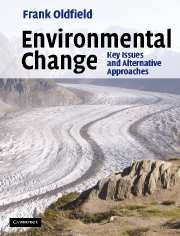Book contents
- Frontmatter
- Contents
- Preface
- Acknowledgements
- List of Permissions
- 1 Defining and exploring the key questions
- 2 An introduction to models and modelling
- 3 The palaeo-record: approaches, timeframes and chronology
- 4 The Palaeo-record: archives, proxies and calibration
- 5 Glacial and interglacial worlds
- 6 The transition from the last glacial maximum to the Holocene
- 7 The Holocene
- 8 The Anthropocene – a changing atmosphere
- 9 The Anthropocene – changing land
- 10 The Anthropocene: changing aquatic environments and ecosystems
- 11 Changing biodiversity
- 12 Detection and attribution
- 13 Future global mean temperatures and sea-level
- 14 From the global to the specific
- 15 Impacts and vulnerability
- 16 Sceptics, responses and partial answers
- References
- Index
16 - Sceptics, responses and partial answers
Published online by Cambridge University Press: 05 June 2012
- Frontmatter
- Contents
- Preface
- Acknowledgements
- List of Permissions
- 1 Defining and exploring the key questions
- 2 An introduction to models and modelling
- 3 The palaeo-record: approaches, timeframes and chronology
- 4 The Palaeo-record: archives, proxies and calibration
- 5 Glacial and interglacial worlds
- 6 The transition from the last glacial maximum to the Holocene
- 7 The Holocene
- 8 The Anthropocene – a changing atmosphere
- 9 The Anthropocene – changing land
- 10 The Anthropocene: changing aquatic environments and ecosystems
- 11 Changing biodiversity
- 12 Detection and attribution
- 13 Future global mean temperatures and sea-level
- 14 From the global to the specific
- 15 Impacts and vulnerability
- 16 Sceptics, responses and partial answers
- References
- Index
Summary
The yearning to believe in oracles has always been with us, but so too has scepticism
Holland (2003)Introduction
Before attempting to bring all the research considered so far to bear on the questions posed at the beginning of the book, we must first deal with the views and assertions of those who are sceptical about the future projections outlined in the last three chapters. Over the last decade, ‘global warming’ sceptics have presented a variety of arguments challenging the claim that future climate change is a major concern for human populations. Dismissing the claim often carries with it the corollary of discharging the present generation from any responsibility to take action designed to limit economic growth based on the energy provided by fossil-fuel combustion.
There is no single sceptical viewpoint and sceptical responses to IPCC-based policy proposals are quite varied. A crucial distinction is between those who challenge the science (hence also all that flows from its projections) and those who accept at least the more moderate research-based projections, but disagree with pro-mitigation scientists and policy makers about the degree to which future changes should be a cause for concern and urgent action. Von Storch and Stehr (2000) express this view neatly: ‘We are convinced that greenhouse gases are accumulating in the air and strongly believe that near-surface temperatures are rising in response. But we are not convinced that present and future climate change will have a significant impact on society and global systems.
- Type
- Chapter
- Information
- Environmental ChangeKey Issues and Alternative Perspectives, pp. 279 - 295Publisher: Cambridge University PressPrint publication year: 2005



